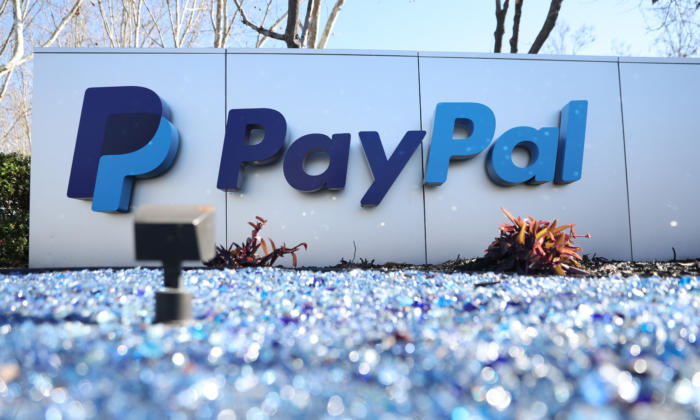
PayPal on Oct. 8 said it was not implementing a new policy that would have enabled the company to seize money from users who allegedly promote “misinformation” or “hate.”
“An AUP notice recently went out in error that included incorrect information. PayPal is not fining people for misinformation and this language was never intended to be inserted in our policy,” a PayPal spokesperson told The Epoch Times in an email.
“Our teams are working to correct our policy pages. We’re sorry for the confusion this has caused,” the spokesperson added.
The company in September announced that it was amending its acceptable use policy, or AUP.
The policy, due to take effect in November, said that users may not use PayPal to for the “sending, posting, or publication of any messages, content, or materials that, in PayPal’s sole discretion, (a) are harmful, obscene, harassing, or objectionable, (b) depict or appear to depict nudity, sexual or other intimate activities, (c) depict or promote illegal drug use, (d) depict or promote violence, criminal activity, cruelty, or self-harm (e) depict, promote, or incite hatred or discrimination of protected groups or of individuals or groups based on protected characteristics (e.g. race, religion, gender or gender identity, sexual orientation, etc.) (f) present a risk to user safety or wellbeing, (g) are fraudulent, promote misinformation, or are unlawful, (h) infringe the privacy, intellectual property rights, or other proprietary rights of any party, or (i) are otherwise unfit for publication.”
For each violation, PayPal says users are subject to repercussions. Those include “liquated damages” of $2,500 per violation. The money will be taken directly from a person’s PayPal account.
Users were directed to PayPal’s user agreement, which states in part that PayPal can take a number of actions if users participate in restricted activities, such as holding their money in balance indefinitely. It also says that “you will be liable to PayPal for the amount of PayPal’s damages caused by your violation of the Acceptable Use Policy” at the amount of $2,500 per violation.
That money will cover internal administrative costs for PayPal to monitor and track violations and damage to PayPal’s brand, among other costs, according to the agreement.
Scores of people noticed the pending update in recent days and many announced on social media they would be closing their accounts.
“Seriously, close your PayPal account immediately if they don’t reverse this today,” Scott Adams, the creator of Dilbert, said.
“It’s hard for me to openly criticize a company I used to love and gave so much to. But @PayPal ’s new AUP goes against everything I believe in. A private company now gets to decide to take your money if you say something they disagree with. Insanity,” added David Marcus, a former president of PayPal.
Still, others had suggested the policy was not a problem.
“PayPal has a tiny clause forbidding spreading fraudulent information or misinformation on the platform. Ya know—so people can’t sell you a magic bean that cures cancer or anything,” Keith Farrell, an author, wrote. “And conservatives are out here telling on themselves, acting like this about them!”
